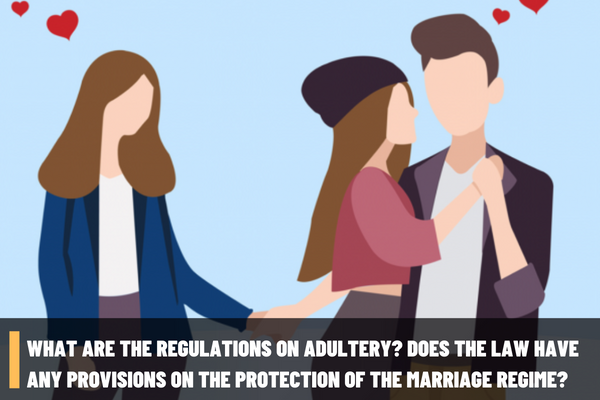What are the regulations on adultery? Does the law have any provisions on the protection of the marriage regime in Vietnam?
Acts of violation of regulations on marriage, divorce and violation of the monogamous marriage regime
Pursuant to the provisions of Article 59 of Decree 82/2020/ND-CP of Vietnam stipulating as follows:
Article 59. Violations against regulations on marriage and divorce and violations of the monogamous marriage regime
1. A fine of between VND 3,000,000 and 5,000,000 shall be imposed for one of the following acts:
a) Any married person who marries with another person, any unmarried person who marries with another person in the knowledge that he/she is already married;
b) Any married person who cohabits with another person;
c) Any unmarried person who cohabits with another person in the knowledge that he/she is already married;
d) Marrying or cohabiting as husband and wife between former adoptive parent and adopted child, a father-in-law and a daughter-in-law, a mother-in-law and a son-in-law, or stepparent and stepchild;
dd) Obstructing marriage, demanding property in marriage or obstructing divorce.
2. A fine of between VND 10,000,000 and 20,000,000 shall be imposed for one of the following acts:
a) Getting married or cohabiting as husband and wife between people of the same direct blood line; relatives within three generations;
b) Getting married or cohabiting as husband and wife between adoptive parent and adopted child;
c/ Forcing a person into divorce; deceiving a person into divorce; obstructing divorce;
d) Taking advantage of marriage to exit, enter, reside or naturalize Vietnamese or foreign nationality; to enjoy the State's preferential regime or to achieve other purposes other than to build a family;
dd) Taking advantage of the divorce to evade property obligations, violate policies and laws on population or to achieve other purposes without the purpose of terminating the marriage.
3. Remedial measures:
Forcible return of illegal profits obtained from committing violations specified at Points d and dd, Clause 2 of this Article.
Thus, according to the above provisions, depending on the violations of the monogamy regime, if there are enough grounds, depending on the severity, they can be administratively sanctioned or can be handled according to the criminal law.

Marriage regime
Adultery
Pursuant to the provisions of Article 182 of the 2015 Criminal Code of Vietnam as follows:
Article 182. Adultery
1. Any married person who marries or cohabits with another person, any unmarried person who marries or cohabits with another person in the knowledge that he/she is already married and in any of the following circumstances shall receive a warning or face a penalty of up to 01 year's community sentence or 03 - 12 months' imprisonment:
a) The offence results in the divorce of one or both parties;
b) The offender has incurred an administrative penalty for the same offence.
2. This offence committed in any of the following circumstances carries a penalty of 06 - 36 months'' imprisonment:
a) The offence results in the suicide of the spouse or child of either party;
b) The court has issued a decision on dissolution of the marriage or compulsory termination of the cohabitation but the offender still defies such decision.
What are the regulations on protection of the marriage and family regime?
Pursuant to Clause 2 Article 5 of the 2014 Law on marriage and family of Vietnam stipulating as follows:
Article 5. Protection of the marriage and family regime in Vietnam
1. Marriage and family relations established and implemented in accordance with this Law shall be respected and protected by law.
2. The following acts are prohibited:
a/ Sham marriage or sham divorce;
b/ Underage marriage, forcing a person into marriage, deceiving a person into marriage, obstructing marriage;
c/ A married person getting married to or cohabitating as husband and wife with another person, or an unmarried person getting married to or cohabitating as husband and wife with a married person;
d/ Getting married or cohabiting as husband and wife between people of the same direct blood line; relatives within three generations; adoptive parent and adopted child; or former adoptive parent and adopted child, father-in-law and daughter-in-law, mother-in-law and son-in-law, or stepparent and stepchild;
dd/ Demanding property in marriage;
e/ Forcing a person into divorce; deceiving a person into divorce; obstructing divorce;
g/ Giving birth with assisted reproductive technology for commercial purpose, commercial gestational surrogacy, prenatal sex selection, cloning;
h/ Domestic violence;
i/ Taking advantage of marriage and family rights for human trafficking, labor exploitation or sexual abuse or committing another act for self-seeking purposes.
2. All acts of violating the marriage and family law shall be handled strictly in accordance with law.
Agencies, organizations and individuals have the right to request a court or another competent agency to take measures to promptly stop and handle violators of the marriage and family law.
3. The honor, dignity, prestige, privacy and other privacy rights of parties shall be respected and protected in the course of settlement of marriage and family-related cases and matters.
Thus, cohabitation as husband and wife is proven by having common children, being considered by neighbors and the surrounding society as husband and wife, and having common property. Currently, it is difficult to penalize adultery because it must be proven that they are cohabiting as husband and wife. Therefore, it can be seen that adultery is a violation of the marriage regime according to current regulations.
LawNet
